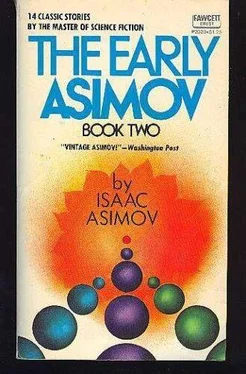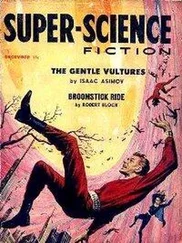Isaac Asimov - The Early Asimov. Volume 2
Здесь есть возможность читать онлайн «Isaac Asimov - The Early Asimov. Volume 2» весь текст электронной книги совершенно бесплатно (целиком полную версию без сокращений). В некоторых случаях можно слушать аудио, скачать через торрент в формате fb2 и присутствует краткое содержание. Год выпуска: 1986, ISBN: 1986, Издательство: Del Rey, Жанр: Фантастика и фэнтези, на английском языке. Описание произведения, (предисловие) а так же отзывы посетителей доступны на портале библиотеки ЛибКат.
- Название:The Early Asimov. Volume 2
- Автор:
- Издательство:Del Rey
- Жанр:
- Год:1986
- ISBN:ISBN: 034-532589-3
- Рейтинг книги:5 / 5. Голосов: 1
-
Избранное:Добавить в избранное
- Отзывы:
-
Ваша оценка:
- 100
- 1
- 2
- 3
- 4
- 5
The Early Asimov. Volume 2: краткое содержание, описание и аннотация
Предлагаем к чтению аннотацию, описание, краткое содержание или предисловие (зависит от того, что написал сам автор книги «The Early Asimov. Volume 2»). Если вы не нашли необходимую информацию о книге — напишите в комментариях, мы постараемся отыскать её.
The Early Asimov. Volume 2 — читать онлайн бесплатно полную книгу (весь текст) целиком
Ниже представлен текст книги, разбитый по страницам. Система сохранения места последней прочитанной страницы, позволяет с удобством читать онлайн бесплатно книгу «The Early Asimov. Volume 2», без необходимости каждый раз заново искать на чём Вы остановились. Поставьте закладку, и сможете в любой момент перейти на страницу, на которой закончили чтение.
Интервал:
Закладка:
'Yes; at a constant speed of two miles per second.'
'Good, I've got you!' Sebastian almost laughed his relief. 'Why haven't the astronomers spotted it in all this while?'
'My God,' responded Hayes, impatiently, 'it's clear you aren't an astronomer. Now, what fool would look to the Southern Celestial Pole for a planet, when they're only found in the ecliptic?'
'But,' pointed out Sebastian, 'the region is studied just the same. It is photographed.'
'Surely! For all I know, the super-neutron has been photographed a hundred times - a thousand times if you like -though the Southern Pole is the most poorly watched region of the sky. But what's to differentiate it from a star? With its low albedo, it never passed eleventh magnitude in brightness. After all, it's hard enough to detect any planets in any case. Uranus was spotted many times before Herschel realized it was a planet. Pluto took years to find even when they were looking for it. Remember also that without gravity, it causes no planetary perturbation, and that the absence of these removes the most obvious indication of its presence.'
'But,' insisted Sebastian, desperately, 'as it approached the sun, its apparent size would increase and it would begin to show a perceptible disc through a telescope. Even if its reflected light were very faint, it would certainly obscure the stars behind it.'
'True,' admitted Hayes. 'I will not say that a really thorough mapping of the Polar Region would not have uncovered it, but such mapping has been done long ago, and the present cursory searches for novae, special spectral types and so on are by no means thorough. Then, as the super-neutron approaches the sun, it begins to appear only in the dawn and twilight - in evening and morning star fashion - so that observation becomes much more difficult. And so, as a matter of fact, it just has not been observed - and it is what should have been expected.'
Again a silence, and I became aware that my heart was pounding. It was two o'clock even, and we hadn't been able to shake Hayes' story. We had to prove it a lie fast, or I'd die of sheer suspense. We were all of us watching the clock.
Levin took up the fight. 'It's an awfully queer coincidence that the super-neutron should be heading straight for the sun. What are the chances against it? Remember, that would be the same thing as reciting the chances against the truth of the story.'
I interposed, 'That is an illegitimate objection, Mr. Levin. To cite improbability, however great, is not sufficient. Only outright impossibility or citation of inconsistency can serve to disqualify.'
But Hayes waved his hand, 'It's all right. Let me answer. Taking an individual super-neutron and an individual star, the chances of collision, head on, are all but infinitely small. However, statistically, if you shoot enough super-neutrons into the universe, then, given enough time, every star ought to be hit sooner or later. Space must be swarming with super-neutrons -say one every thousand cubic parsecs - so that in spite of the vast distances between the stars and the relative minuteness of the targets, twenty novae occur in our single Galaxy every year - that is, there are twenty collisions between super-neutrons and stars annually.
'The situation is no different really from uranium being bombarded with ordinary neutrons. Only one neutron out of a hundred million may score a hit, but, given time, every nucleus is exploded eventually. If there is an outer-universe intelligence directing this bombardment - pure hypothesis, and not part of my argument, please - a year to us is probably an infinitesimal fraction of a second to them. The hits, to them, may be occurring at the rate of billions to their seconds. Energy is being developed, perhaps, to the point where the material this universe composes has become heated to the gaseous state - or whatever passes for the gaseous state there. The universe is expanding, you know - like a gas.'
'Still, for the very first super-neutron entering our system to head straight for the sun seems-' Levin ended in a weak stammer.
'Good Lord,' snapped Hayes, 'who told you this was the first? Hundreds may have passed through the system in geologic times. One or two may have passed through in the last thousand years or so. How would we know? Even when one is headed straight for the sun, astronomers don't find it. Perhaps this is the only one that's passed through since the telescope
was invented, and before then, of course…And never forget
that, having no gravity, they can go right through the middle of the system, without affecting the planets. Only a hit on the sun registers, and then it's too late.'
He looked at the clock, '2.05! We ought to see it now against the sun.' He stood up and raised the window shade. The yellow sunlight streamed in and I moved away from the dusty shaft of light. My mouth was dry as desert sand. Murfree was mopping his brow, but beads of sweat stood out all along his cheeks and neck.
Hayes took out several slips of exposed film-negative and handed them out, 'I came prepared, you see.' He held one up and squinted at the sun. 'There it is,' he remarked placidly, 'My calculations showed it would be in transit with respect to Earth at the time of collision. Rather convenient!'
I was looking at the sun, too, and felt my heart skip a beat. There, quite clear against the brightness of the sun, was a little, perfectly round, black spot.
'Why doesn't it vaporize?' stammered Murfree. 'It must be almost in the sun's atmosphere.' I don't think he was trying to disprove Hayes' story. He had gone past that. He was honestly seeking information.
'I told you,' explained Hayes, 'that it is^ transparent to almost all solar radiation. Only the radiation it absorbs can go into heat and that's a very small percentage of all it receives. Besides, it isn't ordinary matter. It's probably much more re-factory than anything on Earth, and the Solar surface is only at 6,000 degrees Centigrade.'
He pointed a thumb over his shoulder, 'It's 2.09 Ѕ, gentlemen. The super-neutron has struck and death is on its way. We have eight minutes.'
We were dumb with something that was just simply unbearable terror. I remember Hayes' voice, quite matter-of-fact, saying, 'Mercury just went!' then a few minutes later, 'Venus has gone!' and lastly, 'Thirty seconds left, gentlemen!'
The seconds crawled, but passed at last, and another thirty seconds, and still another…
And on Hayes' face, a look of astonishment grew and spread. He lifted the clock and stared at it, then peered through his film at the sun once more.
'It's gone!' He turned and faced us, 'It's unbelievable. I had thought of it, but I dared not draw the atomic analogy too far. You know that not all atomic nuclei explode on being hit by a neutron. Some, cadmium, for instance, absorb them one after the other like sponges do water. I -'
He paused again, drew a deep breath, and continued musingly, 'Even the purest block of uranium contains traces of all other elements. And in a universe of trillions of stars acting like uranium, what does a paltry million of cadmium-like stars amount to - nothing! Yet the sun is one of them! Mankind never deserved that!'
He kept on talking, but relief had finally penetrated and we listened no longer. In half-hysterical fashion, we elected Gilbert Hayes to the office of Perpetual President by enthusiastic acclamation, and voted the story the whoppingest lie ever told.
But there's one thing that bothers me. Hayes fills his post well; the Society is more successful than ever - but 1 think he should have been disqualified after all. His story fulfilled the second condition; it sounded like the truth. But I don't think it fulfilled the first condition.
I think it was the truth!
I had series on my mind by now. 'Super-Neutron' was certainly intended to be but the first in a long chain of very clever and very ingenious tales to be told at the meetings of the 'Honorable Society of Ananias.' It didn't work out that way. There was never a second story, not even the beginnings of one, not even the idea for one.
Читать дальшеИнтервал:
Закладка:
Похожие книги на «The Early Asimov. Volume 2»
Представляем Вашему вниманию похожие книги на «The Early Asimov. Volume 2» списком для выбора. Мы отобрали схожую по названию и смыслу литературу в надежде предоставить читателям больше вариантов отыскать новые, интересные, ещё непрочитанные произведения.
Обсуждение, отзывы о книге «The Early Asimov. Volume 2» и просто собственные мнения читателей. Оставьте ваши комментарии, напишите, что Вы думаете о произведении, его смысле или главных героях. Укажите что конкретно понравилось, а что нет, и почему Вы так считаете.







